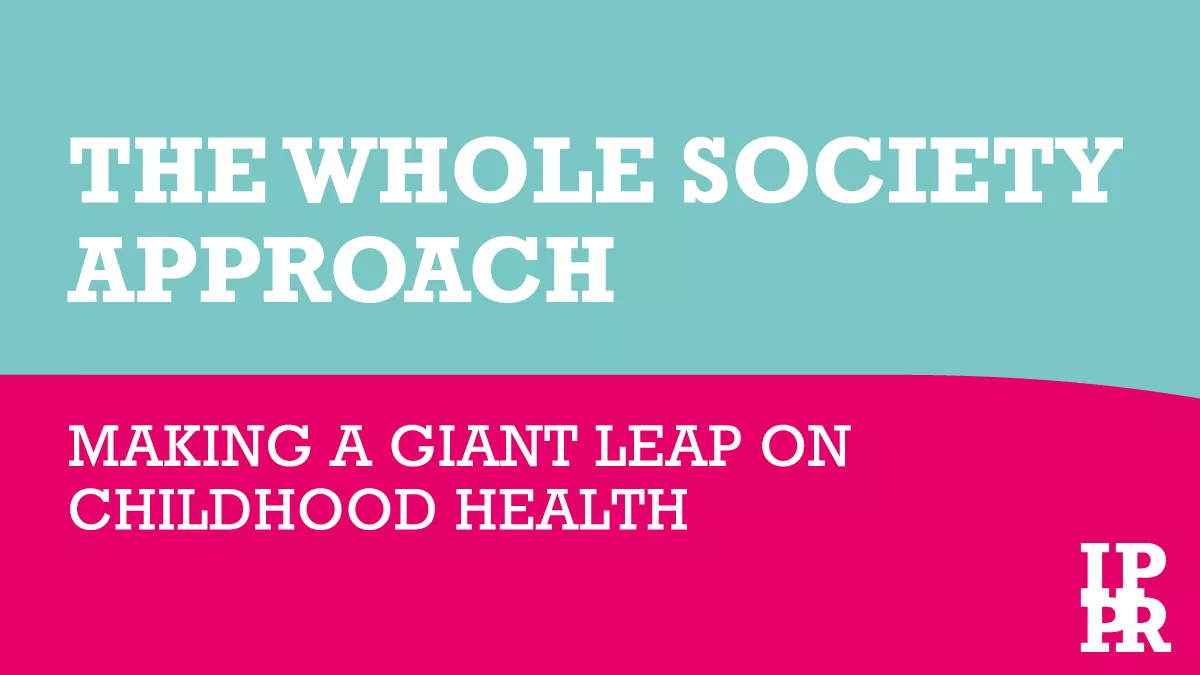
We worked with Cancer Research UK and the British Heart Foundation to jointly fund a report into childhood health. Today, the Institute for Public Policy Research (IPPR) share their findings.
Released today, ‘The Whole Society Approach: Making A Giant Leap On Childhood Health’ looks at how the UK needs to adopt a more preventative approach to healthcare, by tackling rising obesity levels in children.
What does the report say?
The combination of stalled health improvements, new technologies and increasingly persistent and invasive advertising methods have made it harder to have a healthy childhood.
This has meant that children growing up the UK today face a number of growing health risks. One such risk is obesity, which we already know is one of the main risk factors of type 2 diabetes.
The report estimates that if levels of childhood obesity continue to rise, pupils currently in school will generate up to:
- £74 billion in costs for the NHS throughout their lifetime
- £405 billion in costs for the wider society, through lost productivity and sickness.
It goes on to estimate that if the government achieve their target of halving childhood obesity by 2030, it would generate savings of £37 billion for the NHS and £202 billion for the wider society. And that’s just in relation to the current set of pupils in school today.
But it’s clear that if obesity levels continue to follow the same upward trend, the costs to our economy will be enormous. And that’s because the next generation are facing even more harm when it comes to their health, with the report stating that chronic, long-term conditions such as type 2 diabetes are the UK’s ‘defining health challenge’ right now.
In order to overcome this challenge, and protect the health of children growing up in the UK both now and in the future, the IPPR have included several recommendations for the government in their report:
Taxes and incentives to create a healthier environment
The first recommendation proposes that the government introduce a ‘non-essential food levy’ on certain pre-packaged products. This would help to reduce consumption and encourage suppliers to create healthier recipes or formulas.
The revenue from this tax would then be reinvested, with IPPR proposing a voucher that can be spent on all grocery items not covered by the tax. This ‘Healthy Schools’ voucher scheme would be available to all children receiving free school meals and help their families to afford healthier products.
We have previously asked the government to look at ways to make healthier food more affordable than unhealthy food, and so we welcome this recommendation.
An increase in the public health budget
The IPPR recommend that local government is empowered to deliver a wide range of health services within their community.
Since 2014, the report estimates that there has been up to £850 million worth of cuts to public health services across England. This has impacted services that are important to children, with poor funding making it ‘unrealistic’ to tackle growing obesity levels.
That’s why the IPPR have proposed increasing the public health budget by a minimum of £850 million, so that preventative services can begin to help those in need.
We support this call as it is vital for local authorities to be properly funded to provide public health services, such as those for weight management.
More social prescribing
The IPPR also recommends more social prescribing. This is when doctors or healthcare teams refer patients to community or social groups for free health or wellbeing activities.
Currently, social prescribing includes activities to help people keep fit. We support the IPPR’s recommendation for this to be expanded to include cooking and healthy eating advice.
Why is the report important?
Type 2 diabetes is an urgent public health problem. More than 12 million people are at increased risk of developing the condition in the UK.
Our previous findings have shown that people with the condition are 50% more likely to die prematurely than those without it. And we know that around three in five cases of type 2 could be prevented or delayed.
We also know that obesity is one of the biggest causes of type 2 diabetes, and is responsible for 80-85% of someone’s risk of developing the condition. That’s why this report and its recommendations are so important.
We’ve been calling for increased and sustained government action on health and obesity for many years, and the Obesity Strategy launched last month was a welcome step forward that we support.
But, as highlighted in this new report, much more can be done. It’s not always easy to make the healthy choice, and people still need better support to manage their weight.
That’s why we support this report, and will continue to challenge both the government and industry until healthier environments become a reality.
Chris Askew, our Chief Executive Officer said:
“The last few months have truly shone a light on the devastating impact obesity can have on our health. Yet, as this report highlights, our children’s wellbeing is suffering and recent government announcements, while welcomed, must go further if we’re to change this.
Obesity accounts for up to 85% of the risk of type 2 diabetes - a serious condition with life threatening complications, that is more severe the younger you develop it.
There is hope, and this does not have to be our reality. We believe the UK has the opportunity to make another ‘giant leap’ forward, but it is integral that we shift to a preventative approach across society, and not put the blame and responsibility on the individual. The government must be ambitious and bring together all parties, only then we can begin to shape a society where our children’s health is put first.”
Read the full IPPR report Find out more about type 2 diabetes
